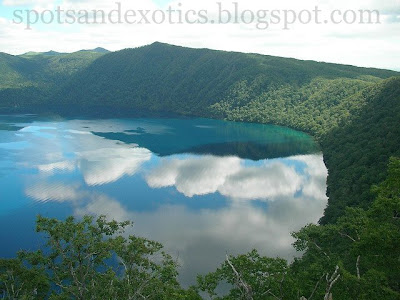Lake Mashū is a landlocked endorheic crater lake formed in the caldera of a potentially active volcano. It is located in Akan National Park on the island of Hokkaidō, Japan. The lake has been called the clearest lake in the world.
Lake Mashū is surrounded by steep crater walls 200 metres (660 ft) high. It has no significant inlets and no outlet. The lake is one of the clearest in the world and one of the deepest in Japan.On August 1, 1931 the transparency of the water was measured at 41.6 metres (136 ft). Lake Baikal was measured around the same time measured 40.5 metres (133 ft). This is the lake's claim to clearest in the world. Since the 1950s the transparency has tended to range between 20 and 30 metres (66 and 98 ft). The loss in transparency is probably due to the introduction of sockeye salmon and rainbow trout into the lake. At the same time, the clarity of Lake Baikal has not been measured.
In summer, the surface of Lake Mashū is often obscured by fog. This has given the lake a reputation for mysteriousness. Local legend says that if you can see the surface of the lake, you will have bad luck.
The Mashu-dake Hiking Course is a trail that goes along the crater rim and to the top of Mount Mashū.There are no settlements along the shores of the lake. Access to the lakeshore itself is prohibited by the Ministry of the Environment (Japan). Visitors may only view the lake from the designated observation towers.
 |
Masyuko-Lake-Hokkaido-Japan
|
In summer, the surface of Lake Mashū is often obscured by fog. This has given the lake a reputation for mysteriousness. Local legend says that if you can see the surface of the lake, you will have bad luck.
The Mashu-dake Hiking Course is a trail that goes along the crater rim and to the top of Mount Mashū.There are no settlements along the shores of the lake. Access to the lakeshore itself is prohibited by the Ministry of the Environment (Japan). Visitors may only view the lake from the designated observation towers.
No comments:
Post a Comment